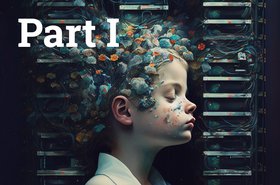The rise of large language models (LLMs) and their increasing adoption into our daily lives has sparked intense debate about their applications and capabilities.
A recent paper from Google AI researchers raises questions about their creative outputs, shedding light on potential limitations beyond their training data. While these models have demonstrated exceptional fluency in language processing, translation, and other defined tasks, evidence that they may struggle to produce truly novel or creative outputs introduces a dose of realism.
Achieving artificial general intelligence
The pursuit of systems with artificial general intelligence, able to perform human-like cognitive tasks fluidly across domains, has long been the aspirational North Star of AI research.
However, the recent evidence about the creative limitations of today’s otherwise highly capable language models suggests the path to achieving AGI may be more complex and winding than initially hoped.
While language models already excel within set parameters, accomplishing the flexible reasoning and contextual understanding needed to emulate general human intelligence remains filled with challenges. New breakthroughs will be coming to progress this development, but for these to be capitalized on, language models need to be grounded in high-quality structured data, with developments measured against the five stages of AGI.
Pursuing twin paths to AI progress
When contrasted with the monumental challenge of artificial general intelligence, AI technologies tailored to narrow, well-defined applications have thrived by focusing development on targeted tasks. Without the burden of attempting to mimic multifaceted human cognition, purpose-built narrow AI often outperforms broader efforts, however massive their data and processing abilities.
From revolutionizing scientific disciplines by accelerating research to transforming healthcare via enhanced diagnosis, specialized AI is already profoundly improving human knowledge and productivity. Expanding and interconnecting these narrowly focused AI techniques represents a pragmatic strategy that can deliver tangible benefits for both businesses and broader society in the coming years.
At the same time, continuing exploratory efforts toward artificial general intelligence remain vital to unlocking AI's fullest potential. Just as today’s narrow AI would seem almost unimaginable a generation ago, steady scientific progress expanding machine learning capabilities could yield profound advances over the long term.
The vital role of human stewardship
As AI develops and its limitations are overcome, maintaining human oversight and stewardship grows only more indispensable.
This is crucially important when considering the huge potential of artificial general intelligence. AGI developed without deep human partnership risks profound unintentional consequences by radically transforming society in unpredictable ways. Instead, extensive collaboration between policymakers and AI pioneers is an absolute necessity throughout the pursuit of AGI.
Rather than an autonomously evolving force operating beyond meaningful control, AGI should be carefully shepherded hand-in-hand with human guidance on matters of accountability, ethics, and oversight. Responsible AGI integration must align closely with societal norms and priorities.
Responsible development demands understanding
While recent AI capabilities are genuinely unprecedented and impressive and as pioneers work to actively expand the frontiers of machine learning, acknowledging current limitations provides crucial guidance for development ahead.
Acknowledging these constraints is not to diminish progress but to inform responsible development.
Understanding specific shortcomings prevents the deployment of AI in scenarios for which it is unprepared, setting up failure along with backlash against the technology. However, properly contextualizing limitations also reveals promising directions to expand capabilities through focused research. Much as the models of yesterday seem limited today, intentional work can systematically push back the boundaries of what AI can accomplish tomorrow.
The recent findings about creativity limits for today’s language models are important additions to the AI conversation. This discovery informs roadmaps towards artificial general intelligence and highlights the power of specialized AI targeted on particular tasks.
Rather than loosely anticipating a utopian AI tomorrow, the path ahead demands renewed focus on incremental enhancements delivering concrete benefits. At the same time, sustained progress elevating machine learning beyond pre-defined constraints relies on an unwavering commitment to ethical human partnership every step of the way.
By balancing respect for accomplishments with recognition of limitations, we maximize the potential for previously unimaginable achievements. On this journey towards beneficial co-existence with artificial intelligence, anchoring innovation firmly within the harbor of transparency and human wisdom is essential to realize a bright future ahead enhanced by AI, rather than disrupted by it.





